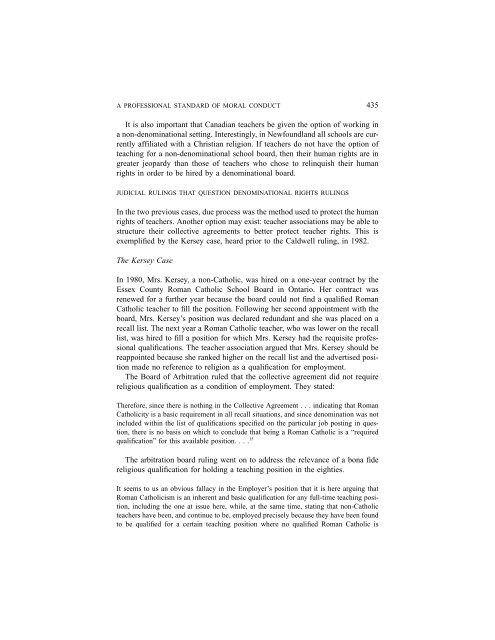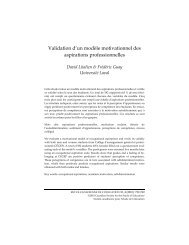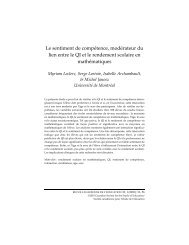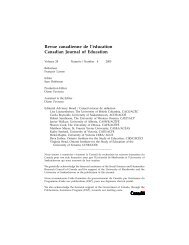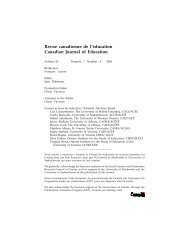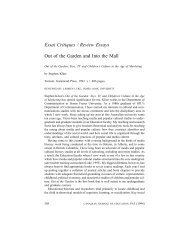Mireille Falardeau et Michel Loranger Le choix de stratégies ... - CSSE
Mireille Falardeau et Michel Loranger Le choix de stratégies ... - CSSE
Mireille Falardeau et Michel Loranger Le choix de stratégies ... - CSSE
You also want an ePaper? Increase the reach of your titles
YUMPU automatically turns print PDFs into web optimized ePapers that Google loves.
A PROFESSIONAL STANDARD OF MORAL CONDUCT 435<br />
It is also important that Canadian teachers be given the option of working in<br />
a non-<strong>de</strong>nominational s<strong>et</strong>ting. Interestingly, in Newfoundland all schools are currently<br />
affiliated with a Christian religion. If teachers do not have the option of<br />
teaching for a non-<strong>de</strong>nominational school board, then their human rights are in<br />
greater jeopardy than those of teachers who chose to relinquish their human<br />
rights in or<strong>de</strong>r to be hired by a <strong>de</strong>nominational board.<br />
JUDICIAL RULINGS THAT QUESTION DENOMINATIONAL RIGHTS RULINGS<br />
In the two previous cases, due process was the m<strong>et</strong>hod used to protect the human<br />
rights of teachers. Another option may exist: teacher associations may be able to<br />
structure their collective agreements to b<strong>et</strong>ter protect teacher rights. This is<br />
exemplified by the Kersey case, heard prior to the Caldwell ruling, in 1982.<br />
The Kersey Case<br />
In 1980, Mrs. Kersey, a non-Catholic, was hired on a one-year contract by the<br />
Essex County Roman Catholic School Board in Ontario. Her contract was<br />
renewed for a further year because the board could not find a qualified Roman<br />
Catholic teacher to fill the position. Following her second appointment with the<br />
board, Mrs. Kersey’s position was <strong>de</strong>clared redundant and she was placed on a<br />
recall list. The next year a Roman Catholic teacher, who was lower on the recall<br />
list, was hired to fill a position for which Mrs. Kersey had the requisite professional<br />
qualifications. The teacher association argued that Mrs. Kersey should be<br />
reappointed because she ranked higher on the recall list and the advertised position<br />
ma<strong>de</strong> no reference to religion as a qualification for employment.<br />
The Board of Arbitration ruled that the collective agreement did not require<br />
religious qualification as a condition of employment. They stated:<br />
Therefore, since there is nothing in the Collective Agreement . . . indicating that Roman<br />
Catholicity is a basic requirement in all recall situations, and since <strong>de</strong>nomination was not<br />
inclu<strong>de</strong>d within the list of qualifications specified on the particular job posting in question,<br />
there is no basis on which to conclu<strong>de</strong> that being a Roman Catholic is a “required<br />
qualification” for this available position. ... 15<br />
The arbitration board ruling went on to address the relevance of a bona fi<strong>de</strong><br />
religious qualification for holding a teaching position in the eighties.<br />
It seems to us an obvious fallacy in the Employer’s position that it is here arguing that<br />
Roman Catholicism is an inherent and basic qualification for any full-time teaching position,<br />
including the one at issue here, while, at the same time, stating that non-Catholic<br />
teachers have been, and continue to be, employed precisely because they have been found<br />
to be qualified for a certain teaching position where no qualified Roman Catholic is


